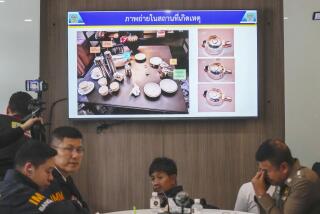Tourism was a powerful economic engine in Thailand. Then a boat full of Chinese sank
Phuket — Phuket’s old town, with its open-air noodle shops and brightly painted Sino-Portuguese shop fronts, is a favorite social media and selfie backdrop for tourists from China. The island, which has a year-round population of 500,000, typically attracts about 7 million foreign visitors a year, of whom 2 million are Chinese — Thailand’s biggest source of tourists.
Chinese tourists can normally even be relied on to come to Phuket in the May to October rainy season, when Europeans mostly stay away. But this month Thalang Road, in the heart of the old town, has been largely deserted.
Chinese groups canceled trips to Phuket en masse last year after a boat carrying tourists from the mainland capsized in July, killing 47 people. This season, say tradespeople, things are even worse. According to the local hotel association, occupancy on the island is running at only 40% to 50%.
Chutimon Konglao, a minivan driver, says this is the worst season she has seen in more than a decade of driving tourists around the island.
“After the boat accident, we could really see an impact, but this year is worse,” she says. “Nobody wants to spend money, and nobody knows what will happen.”
From Phuket’s old town to Chiang Mai’s temples and Bangkok’s backpacker hostels, visitor numbers are falling, and Thailand’s cornerstone tourist industry is heading into a slump.
For decades, Thailand has been a model of how to turn tourism into a national “brand” and a powerful motor of economic growth. With a product that mixes beaches, hedonistic nightlife, food, discount shopping and an air of spirituality, it has managed to attract both backpackers and luxury tourists from western countries in search of winter sun. In the past few years, it has also drawn in a record number of Chinese tourists who were — until recently — seen as a source of limitless growth.
However, Thai tourism is now struggling and faces three challenges. First, the slowing economy in China has meant fewer visitors, compounding the decline in arrivals seen after the Phuket boat accident. Second, Thai hoteliers and tour operators have been whiplashed by the move toward more independent travel empowered by the surge in digital travel agencies and companies such as Airbnb.
Third, the Thai baht has risen sharply against the dollar this year, eroding the kingdom’s fabled selling point as a value-for-money destination.
“They may feel like the cost is too high compared to Vietnam or Cambodia,” says Ben-ya Hararak, a Phuket travel agency owner, when asked why people were staying away from the island.
Critics say Thai policymakers and businesspeople, who have applied their minds skillfully to digital transformation of industries such as retail and manufacturing, appear to be stuck in a numbers game of shooting for visitor records at all costs without devoting enough attention to the infrastructure, skills or services needed to support tourism.
“Thailand has not thought enough about the ecosystem of a more mature tourist industry,” says Pavida Pananond, associate professor at Thammasat Business School in Bangkok. “I think we need to balance between the need for headcount and the quality of tourist sites.”
Tourism is both Thailand’s biggest export and its best-known product: the kingdom’s calling card, and a deep well of goodwill for this country of 69 million. The sector generates about 10% of gross domestic product in southeast Asia’s second-largest economy, according to the World Travel and Tourism Council.
As the country set new foreign visitor records in recent years, tourism became a perpetual golden goose on which economic planners could rely.
The more than $100 billion a year that tourism generates directly and indirectly is the single biggest contributor to the kingdom’s reliably healthy current account surplus — the main indicator causing foreign investors to park money in Thai baht securities as a “safe haven” asset, pushing up the currency. But analysts are beginning to notch down their forecasts for the industry, at least for the near to medium term.
Prayuth Chan-ocha’s government last week put tourism at the center of a $10-billion stimulus plan, extending free visas on arrival for another six months for several countries and offering domestic tourists cash bonuses and rebates. (The cabinet balked, however, at a proposal to allow Chinese and Indian citizens to travel visa-free, citing security concerns.)
The slowdown in tourism comes amid a broader reckoning. Thai GDP growth of just 2.3% in the second quarter lagged behind most of its neighbors. The industries on which Thailand built its wealth in the 1980s and 1990s, including low-cost manufacturing and carmaking, are transforming and the kingdom needs work to catch up.
Some economists say Thailand risks falling into a “middle-income trap”— no longer poor but lacking the tools and momentum to become rich when digital, IT and other skills are in demand. Nearby Vietnam is the region’s rising economic star. Its tourist numbers are growing in the double digits, drawing the kind of younger visitors who first came to Thailand two or three decades ago.
“Thailand is at risk of losing share in the low-budget holiday sector as the tourism markets develop in neighboring Vietnam and Cambodia,” Fitch Solutions said in a recent analysis.
Until recently, Thais complained not of too few Chinese tourists but too many — especially group tours whose profits went back mainly to operators from the mainland, a practice known as “zero-dollar” tourism.
European budget travelers were the main driving force behind the Thai industry’s growth in past decades. But Chinese tourism took off starting in 2012 with the release of a hit Chinese comedy movie “Lost in Thailand.” Budget carriers laid on flights from more than a dozen cities to Thailand. Chinese visitors, including many traveling abroad for the first time, became Thai tourism’s largest source of visitors and income.
That all changed in July 2018 when the Phoenix, a boat carrying 101 people, capsized in a sudden storm off Phuket while returning from Koh Racha, a snorkeling island. Just over half made it to safety on lifeboats.
The incident spread on Chinese social media, shocking many potential visitors. Some Chinese tour operators who had set up shop in Phuket moved to Vietnam after the sinking, while charter companies rerouted flights.
In September, a Thai security guard at Bangkok’s Don Mueang airport, which handles most budget flights from China, was captured on film throwing a punch at a Chinese visitor. The clip went viral, further deterring potential visitors to the “Land of Smiles.”
According to Thai government statistics, tourist arrivals are up less than 2% in the year through June, but arrivals from China are down by nearly 5%. Thailand’s main tourism promotion body insists the industry is on its way to setting another record of hosting more than 41 million visitors this year. “There is always room for improvement, of course, but as a rule I believe our inventory of tourism products is well suited to attract visitors for many years to come,” Yuthasak Supasorn, the TAT’s governor, told the FT.
However, foreign industry analysts and some Thai service providers say the sector is already in a downturn. STR, a data and analytics group that tracks hotel bookings, told the FT that the occupancy in Thailand for the first half of this year was down 3.5% and down 7.6% for Phuket.
ForwardKeys, another consultancy that tracks global flight bookings, estimates that these are down 2.3% in the year through July for Thailand, compared with a rise of 6.9% for Vietnam.
The group ascribes the drop to the strong baht, the Phuket boat disaster and Thailand’s temporary closing of Maya Beach, the idyllic setting for the 2000 film “The Beach” that had been mobbed by tourists.
“There has been a perception that Thai authorities were not sufficiently mindful of safety, and this has not resonated well in China,” says ForwardKeys’ spokesperson David Tarsh.
The slowdown in tourism has highlighted lapses in development of its infrastructure; Thailand’s five main airports are all accommodating millions more passengers than they have capacity for, meaning long queues on arrival.
“People are waiting an hour to an hour-and-a-half just to get through immigration,” says Sanga Ruangwattanakul, president of the business association on Bangkok’s Khaosan Road, a haunt of backpackers, who says business is down 20% to 30% this year.
In Phuket, officials say the downturn owes to factors larger than the boat disaster, or the Chinese economic slowdown. They point to bigger trends that clever marketing may not so easily fix. The rise of digital travel agencies and disruptive apps such as Airbnb threaten to leave Thailand’s less nimble hoteliers and tour operators behind.
Thai authorities over the past four years have successfully cracked down on “zero dollar” groups in a bid to keep more Chinese money in Thailand. Now more independent Chinese travelers are coming to Phuket — potentially good news for the local economy, but a challenge for an industry set in its ways.
“When Chinese visitors changed from groups to independent travel, that affected consumer behavior in a way Thai investors are not familiar with,” says Sukris Koyakradej, who is responsible for international marketing with the Phuket Tourist Assn. More Chinese tourists began staying in private accommodation or unregistered hotels, he says.
Thai hotels and other service providers, Sukris says, mostly lack the Chinese-language skills and know-how to speak to individual travelers via Weibo and other Chinese social media platforms.
While Phuket’s hotel operators are feeling the pinch of empty rooms, Chinese visitors are still booking private accommodation or space in unregistered hotels via Chinese sites or foreign platforms such as Airbnb.
“Unfortunately, it’s a slow move for investors to learn these things,” Sukris says. “They got used to dealing with tour groups and agents that fed them hand to mouth, and that created less competitiveness.”
Thai authorities insist they are not standing idly by. Bangkok’s two main airports are undergoing big expansions that will equip them to take millions more passengers. Airports of Thailand is also planning a new international airport in Phang Nga, near Phuket.
TAT have five offices in China, which are “working on all cylinders” to lure Chinese visitors back, says Chattan Kunjara Na Ayudhya, a Tourism Authority of Thailand official responsible for marketing in Asia.
However, some analysts think Thai tourist executives are still too focused on quick fixes and the quantity of tourists rather than the quality of their experiences. Somkiat Tangkitvanich, president of Thailand Development Research Institute, a think-tank, thinks the industry should become more astute at using big data to analyze tourists’ needs or take advantage of fewer visitors to carry out maintenance at tourist sites or train employees.
“We should look at turning the crisis into an opportunity,” he says. “This year is going to be different. The industry won’t grow so fast, so there should be an opportunity . . . to do things we didn’t do for a long time.”
© The Financial Times Ltd. 2019. All Rights Reserved. FT and Financial Times are trademarks of the Financial Times Ltd. Not to be redistributed, copied or modified in any way.
More to Read
Inside the business of entertainment
The Wide Shot brings you news, analysis and insights on everything from streaming wars to production — and what it all means for the future.
You may occasionally receive promotional content from the Los Angeles Times.










